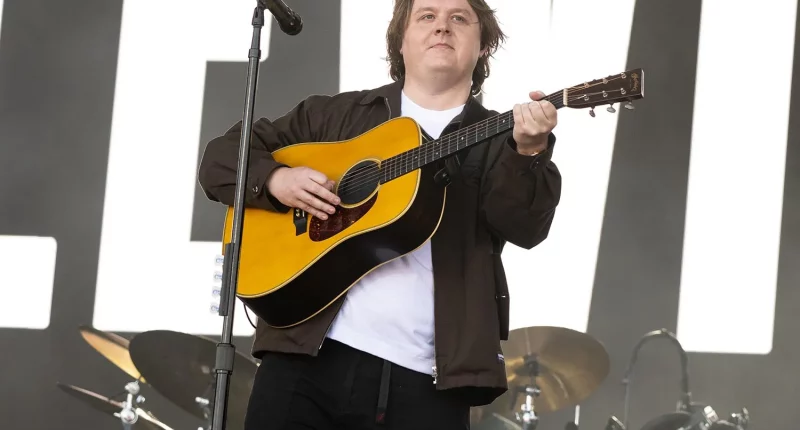Lewis Capaldi, the Scottish singer-songwriter known for his emotional ballads and candid personality, has opened up about the significant role therapy played in helping him return to music after a difficult period of mental health challenges. Speaking openly about his diagnosis with Tourette’s syndrome and ongoing struggles with anxiety, Capaldi credits professional help for giving him the clarity and emotional balance he needed to reconnect with his passion.
In a heartfelt statement, Capaldi revealed, “Therapy helped me be a musician again.” After nearly two years away from the stage, the 27-year-old made a powerful comeback at Glastonbury, performing in front of thousands of fans. His return was emotional—not just for the crowd, but also for Capaldi, who described the moment as overwhelming yet healing. While his voice has captivated millions, it was his courage to confront the realities of living with Tourette’s and anxiety that resonated most.
:max_bytes(150000):strip_icc():focal(717x264:719x266):format(webp)/Lewis-Capaldi-Glastonbury-070725-ff6c7e889dc7416790617ba2f2756867.jpg)
What Led to His Break from the Spotlight?
Capaldi’s decision to take a break from the limelight wasn’t made lightly. In 2022, he revealed that he had been diagnosed with Tourette’s syndrome, a neurological disorder that causes involuntary tics. Though it had been affecting him for years, the formal diagnosis brought relief—and clarity. “I thought I was dying,” he once confessed during an interview, explaining how his tics and symptoms had initially sparked fears of a more serious condition.
Combined with relentless touring, press obligations, and the pressure to produce hit records, Capaldi’s anxiety began to spiral. Fans had noticed his absence from the charts and live shows, but many were unaware of the inner turmoil that caused it. According to the Anxiety and Depression Association of America (ADAA), over 40 million adults in the U.S. alone suffer from anxiety disorders—a reminder of how common yet isolating the condition can feel.
How Lewis Is Managing His Mental Health Now
Since stepping away, the singer has been candid about learning to live with his condition, not just manage it. “I’ve accepted that anxiety might always be there,” he said. “Now I’m focusing on how I respond to it.” This approach reflects a growing trend in modern therapy—teaching clients to coexist with discomfort rather than eliminate it altogether.
Capaldi’s therapeutic journey included:
- Regular sessions with licensed therapists specializing in cognitive behavioral therapy (CBT).
- Mindfulness practices that helped him remain grounded during panic episodes.
- Limiting social media exposure, especially during emotionally vulnerable periods.
- Open conversations with family, friends, and bandmates about his struggles.
These techniques aren’t just celebrity wellness trends. According to the National Institute of Mental Health (NIMH), CBT is among the most effective treatments for anxiety, often reducing symptoms significantly within just 12 to 16 weeks.
Why His Glastonbury Performance Mattered
Weeks before speaking out publicly about his recovery, Capaldi stepped onto the Glastonbury stage for the first time in two years. The crowd’s energy, the lights, and the sheer gravity of the moment were almost too much for him—but in the best way. Fighting through visible tics and occasional vocal strain, he finished his set to roaring applause.
Many saw this as more than a concert—it was a victory. Not just over his anxiety and Tourette’s, but over the stigma that still surrounds mental health in the entertainment industry. Capaldi’s vulnerability turned into strength, and his fans embraced him for it.
View this post on Instagram
What This Means for Fans and Others Struggling
Capaldi’s journey isn’t just inspiring—it’s educational. His openness reminds fans that success doesn’t exempt anyone from mental health challenges. If anything, the pressure of fame can intensify those struggles. But therapy, self-awareness, and community support can pave the way to healing.
For fans who may be going through similar experiences, Lewis Capaldi’s story sends a powerful message:
- It’s okay to ask for help.
- You’re not weak for stepping back.
- There’s no shame in mental health therapy.
- Returning to your passion is always possible—with time and care.
Common Questions About Tourette’s and Anxiety in Musicians
Q. What is Tourette’s Syndrome, and how does it affect musicians?
Ans. Tourette’s is a neurological disorder characterized by repetitive, involuntary movements and vocalizations known as tics. For musicians like Capaldi, this can impact performance and public appearances, especially under stress.
Q. How can therapy help artists with anxiety?
Ans. Therapy equips individuals with coping tools like CBT, exposure therapy, and mindfulness. For artists who constantly face public scrutiny, these tools are vital in reducing panic, building confidence, and sustaining a healthy career.
Q. Why did Lewis Capaldi stop performing for a while?
Ans. Capaldi paused his music career to focus on his mental health after being diagnosed with Tourette’s and experiencing high levels of anxiety. The break allowed him to seek therapy and regain emotional stability.
Q. Has he returned to music full-time?
Ans. While he has returned to the stage, Capaldi is prioritizing his health. His recent Glastonbury appearance marked a tentative yet powerful step forward in his comeback.
Final Thoughts
Lewis Capaldi’s honesty about his mental health battles—especially as someone constantly under the public eye—serves as a beacon for others. Through therapy, he has not only reclaimed his artistry but also redefined what strength looks like in an industry often focused on perfection.
In today’s world, where anxiety and neurological disorders are still too often misunderstood, his voice carries far beyond the lyrics of a song. It speaks to resilience, authenticity, and the ongoing journey of healing.
Also Read | Jessie J Shares Breast Cancer Update: ‘Happy Tears Are Real’









